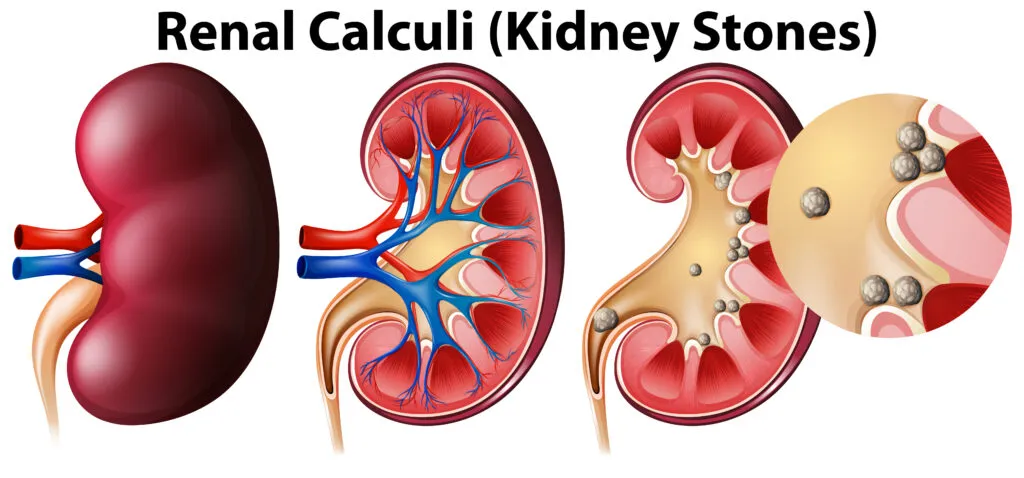Warning Signs and Symptoms of Kidney Stones

Introduction: Signs and Symptoms of Kidney Stones
Signs and Symptoms of Kidney Stones are no joke. These small, pebble-like deposits can wreak havoc on your body, causing excruciating pain and potentially leading to serious complications if left untreated. While some kidney stones may pass on their own, others require medical intervention. Recognizing the warning signs early can make all the difference in managing this painful condition. In this blog, we’ll explore the key warning signs of kidney stones that you must never ignore.
Intense and Persistent Pain:
This pain typically starts suddenly and may come in waves. It often originates in the back or side, below the ribs, and radiates to the lower abdomen and groin. The pain may vary in intensity but is often described as sharp, stabbing, or throbbing. If you experience persistent, severe pain that doesn’t seem to go away, it’s crucial not to dismiss it as mere discomfort.
Discolored Urine:
Changes in urine color can also signal the presence of kidney stones. If you notice that your urine is pink, red, brown, or cloudy, it could indicate the presence of blood, pus, or minerals from kidney stones. While certain foods and medications can also affect urine color, persistent abnormal coloration should prompt a visit to your healthcare provider.
Urinary Urgency and Frequency:
Kidney stones can irritate the lining of the urinary tract, leading to urinary urgency and increased frequency. You may feel a constant need to urinate, even if you’ve just emptied your bladder. Additionally, you might experience difficulty passing urine or a sensation of incomplete emptying. Pay attention to any changes in your urinary habits, as they could be indicative of underlying kidney stone issues.
Nausea and Vomiting:
Nausea and vomiting are common accompanying symptoms of kidney stones, especially when the pain is severe. The intense discomfort caused by kidney stones can trigger a nauseous feeling and may lead to vomiting in some cases. If you’re experiencing unexplained nausea or vomiting along with other symptoms like pain or urinary changes, it’s essential to seek medical attention promptly.
Fever and Chills:
In some instances, kidney stones can lead to complications such as urinary tract infections (UTIs). If bacteria become trapped behind a stone, they can multiply and cause an infection. Fever, chills, and general feelings of malaise may accompany a UTI caused by kidney stones. These systemic symptoms should not be ignored, as they could indicate a more serious underlying condition requiring medical treatment.
Difficulty Passing Urine:
As kidney stones move through the urinary tract, they can obstruct the flow of urine, causing difficulty passing urine. You may experience a sensation of urinary blockage or notice that your urine stream is weaker than usual. In severe cases, complete urinary obstruction can occur, leading to a medical emergency. If you’re having trouble urinating, don’t delay seeking medical help.
Conclusion:
Ignoring the warning signs of kidney stones can lead to complications and prolonged discomfort. If you experience any of the symptoms mentioned above, it’s crucial to consult your healthcare provider promptly. Early diagnosis and treatment can help alleviate pain, prevent complications, and improve outcomes. Don’t brush off the signs – take action to protect your kidney health.
FAQs:
What are the common symptoms of kidney stones?
The symptoms of kidney stones can vary depending on the size and location of the stone. However, common symptoms include intense pain in the back, side, abdomen, or groin, changes in urine color (such as pink, red, or brown), urinary urgency and frequency, nausea, vomiting, and difficulty passing urine.
What factors increase the risk of developing kidney stones?
Several factors can contribute to the formation of kidney stones, including dehydration, a diet high in sodium or oxalate-rich foods (such as spinach, nuts, and chocolate), certain medical conditions (like gout or urinary tract infections), family history of kidney stones, obesity, and certain medications.
How are kidney stones diagnosed?
Diagnosis of kidney stones typically involves a combination of medical history review, physical examination, and diagnostic tests. These may include imaging tests like X-rays, ultrasound, or CT scans to visualize the stones and assess their size and location. Urine tests may also be performed to analyze urine composition and identify any underlying causes.
What treatment options are available for kidney stones?
Treatment for kidney stones depends on factors such as the size, type, and location of the stones, as well as the severity of symptoms. Small stones may pass on their own with ample hydration and pain management. Other treatment options include medications to help dissolve stones, procedures such as lithotripsy to break up larger stones, or surgical removal of stones in certain cases. Lifestyle modifications, such as increased fluid intake and dietary changes, may also be recommended to prevent recurrence. Treatment decisions are best made in consultation with a healthcare provider based on individual circumstances.
Must read:
What Causes Numbness in Hands While Sleeping?
Secrets of DMT Meditation: What Is DMT Meditation and How Does It Work?
Benefits of Cirkul Water Bottle for On-the-Go Hydration | 2023
Why Does Conjunctivitis Eye Infection Happen? | Pink Eye | 2023
Exploring the Exciting World of AI Technology | 2023
Top 8 Japanese Dog Breeds: A Closer Look at the Most Beloved and Iconic Breeds from Japan
Reason Behind Pollution in Delhi in Winter Season: Causes and Solutions
A Festival of Lights and Togetherness in India
Why is Quantum Computing Useful For Optimization Problems? | Reshaping Industries | 2023
Do You Know? – How to apply for overseas education loan in India
New Heights: The Race for America’s Tallest Building | 2024






